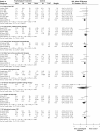Effectiveness of psychological treatments for depressive disorders in primary care: systematic review and meta-analysis
- PMID: 25583894
- PMCID: PMC4291267
- DOI: 10.1370/afm.1719
Effectiveness of psychological treatments for depressive disorders in primary care: systematic review and meta-analysis
Abstract
Purpose: We performed a systematic review of the currently available evidence on whether psychological treatments are effective for treating depressed primary care patients in comparison with usual care or placebo, taking the type of therapy and its delivery mode into account.
Methods: Randomized controlled trials comparing a psychological treatment with a usual care or a placebo control in adult, depressed, primary care patients were identified by searches in MEDLINE, Embase, Cochrane Central Register of Controlled Trials (CENTRAL), and PsycINFO up to December 2013. At least 2 reviewers extracted information from included studies and assessed the risk of bias. Random effects meta-analyses were performed using posttreatment depression scores as outcome.
Results: A total of 30 studies with 5,159 patients met the inclusion criteria. Compared with control, the effect (standardized mean difference) at completion of treatment was -0.30 (95% CI, -0.48 to -0.13) for face-to-face cognitive behavioral therapy (CBT), -0.14 (-0.40 to 0.12) for face-to-face problem-solving therapy, -0.24 (-0.47 to -0.02) for face-to-face interpersonal psychotherapy, -0.28 (-0.44 to -0.12) for other face-to-face psychological interventions, -0.43 (-0.62 to -0.24) for remote therapist-led CBT, -0.56 (-1.57 to 0.45) for remote therapist-led problem-solving therapy, -0.40 (-0.69 to -0.11) for guided self-help CBT, and -0.27 (-0.44 to -0.10) for no or minimal contact CBT.
Conclusions: There is evidence that psychological treatments are effective in depressed primary care patients. For CBT approaches, substantial evidence suggests that interventions that are less resource intensive might have effects similar to more intense treatments.
Keywords: cognitive therapy; depression; depressive disorders; primary health care; psychotherapy; review, systematic; therapeutics.
© 2015 Annals of Family Medicine, Inc.
Figures


Comment in
-
Treatment of depression in primary care.Ann Fam Med. 2015 Jan-Feb;13(1):3-5. doi: 10.1370/afm.1726. Ann Fam Med. 2015. PMID: 25583883 Free PMC article. No abstract available.
-
Psychological treatments are effective for depression in primary care, study shows.BMJ. 2015 Jan 14;350:h174. doi: 10.1136/bmj.h174. BMJ. 2015. PMID: 25588380 No abstract available.
References
-
- Demyttenaere K, Bruffaerts R, Posada-Villa J, et al. ; WHO World Mental Health Survey Consortium. Prevalence, severity, and unmet need for treatment of mental disorders in the World Health Organization World Mental Health Surveys. JAMA. 2004;291(21):2581–2590. - PubMed
-
- Parikh SV, Segal ZV, Grigoriadis S, et al. ; Canadian Network for Mood and Anxiety Treatments (CANMAT). Canadian Network for Mood and Anxiety Treatments (CANMAT) clinical guidelines for the management of major depressive disorder in adults. II. Psychotherapy alone or in combination with antidepressant medication. J Affect Disord. 2009;117(Suppl 1):S15–S25. - PubMed
-
- National Collaborating Centre for Mental Health. Depression: The NICE Guideline on the Treatment and Management of Depression in Adults, updated edition. Leicester, England: British Psychological Society; London, England: Royal College of Psychiatrists; 2010.
-
- DGPPN. BÄK, KBV, AWMF, AkdÄ, PPtK, DAGSHG, DEGAM, DGPM, DGPs, DGRW. S3-Leitlinie/Nationale Versorgungleitlinie Unipolare Depression - Langfassung. http://www.leitlinien.de/nvl/depression/ Published 2009.
Publication types
MeSH terms
LinkOut - more resources
Full Text Sources
Other Literature Sources
Medical
Miscellaneous
